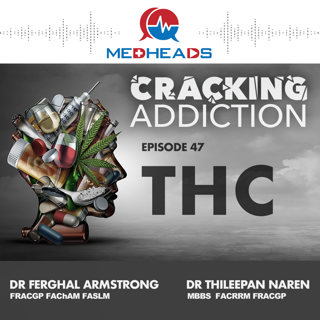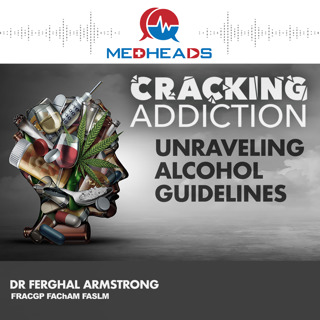
Unraveling Alcohol Guidelines: Australia, the United States, and Canada
In this episode of Cracking Addiction, Dr Fergal Armstrong explores the differences in alcohol consumption guidelines across various countries. He breaks down what constitutes a standard drink in Australia and the United States and discusses the recommended limits for men and women in each country. Dr. Armstrong also delves into the Canadian guidelines, which advocate for a very low alcohol intake to minimize the risk of alcohol-related consequences. He highlights the dose-response relationship between alcohol consumption and the increased risk of various health issues, including liver disease, heart disease, and cancer. Episode Focus Keyword: Alcohol Consumption GuidelinesIn this episode, listeners will learn:1. Understanding Standard Drink Measurements:Dr Armstrong explains the standard drink measurements in Australia and the USA, shedding light on the discrepancies and how they affect alcohol consumption guidelines. By understanding the concept of standard drinks, listeners can accurately assess their alcohol intake and comprehend the differences in guidelines between countries.Actionable Takeaway: When assessing alcohol consumption, use the standard drink measurements provided by your country's guidelines to make informed decisions about safe drinking practices.2. Risks of Alcohol Dependency:Dr Armstrong elucidates the thresholds for alcohol dependency in men and women, emphasizing the correlation between excessive alcohol consumption and the increased risk of dependency. By recognising these thresholds, individuals can monitor their alcohol intake and mitigate the risk of developing dependency.Actionable Takeaway: Monitor your alcohol consumption to ensure it falls within the recommended thresholds, thereby reducing the risk of alcohol dependency.3. Variances in Global Guidelines:The episode compares alcohol consumption guidelines in Australia, the USA, and Canada, highlighting the differences in recommended alcohol limits and their implications for long-term health. By understanding these variances, listeners can appreciate the diverse approaches to alcohol consumption and make informed choices based on their local guidelines.Actionable Takeaway: Familiarise yourself with the alcohol consumption guidelines specific to your region to align your drinking habits with the recommended limits for optimal health outcomes.Quote or Insight:"The harms of alcohol are cumulative and have a dose-response. To minimize long-term harms, you need to keep your alcohol consumption quite low." - Dr Ferghal Armstrong
3 Apr 20247min
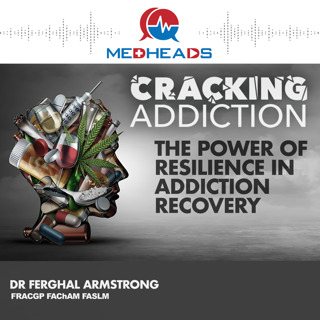
The Power of Resilience in Addiction Recovery
In this episode, Dr. Armstrong delves deep into the concept of resilience and its vital role in addiction recovery. He provides practical insights on the four key processes essential for developing resilience, shedding light on the significance of mastery, vicarious mastery, exhortation, and emotional regulation. Whether you or someone you know is battling addiction, this episode offers invaluable guidance and strategies for enhancing resilience in the face of challenges.🎯 **Focus Keyword: Resilience in Addiction Recovery**🎓 **Learning Outcomes**1. **Understanding the Elements of Resilience**: Dr. Armstrong elucidates the crucial components of resilience, emphasizing the role of mastering daily routines and achieving small victories in fostering confidence and resilience. He highlights the significance of personal mastery in building the groundwork for resilience and sustained recovery.2. **The Power of Vicarious Mastery**: Through inspiring stories shared in peer support groups, individuals on their recovery journey gain access to vicarious mastery. Dr. Armstrong underscores the importance of surrounding oneself with individuals committed to similar goals, demonstrating how learning from others' experiences can ignite confidence and motivation.3. **Embracing Exhortation for Progress**: Dr Armstrong discusses the impact of counselling and therapeutic interventions on the stages of change in addiction recovery. He reveals how counsellors' guidance and accountability can propel individuals through the cycle of change, nurturing resilience and fortitude.4. **Unlocking Emotional Regulation Techniques**: The episode introduces practical techniques for emotional regulation, such as the physiological sigh, which can help individuals manage overwhelming emotions and maintain a calm state of mind. Dr. Armstrong provides insights into the importance of emotional balance in fostering resilience and overcoming temptations.🚀 **Actionable Takeaways**1. **Cultivate Mastery through Daily Achievements**: Incorporate achievable goals and routines into your daily life to build a foundation of success and confidence, laying the groundwork for resilience.2. **Engage in Peer Support Groups for Inspiration**: Actively participate in peer support groups to gain insight from others' recovery journeys, leveraging their experiences to fuel your own determination and resilience.3. **Embrace Counseling and Therapeutic Support**: Seek professional guidance and counselling to navigate the stages of change in addiction recovery, leveraging the accountability and insights provided to progress toward resilience and long-term recovery.4. **Harness Emotional Regulation Techniques**: Implement techniques like the physiological sigh to manage emotional upheavals and cultivate a balanced state of mind, enhancing your ability to resist temptations and build resilience.🌟 **Quote**: "It might be making your bed. It's something as basic as that. But if that becomes part of your routine, that routine of mastery, that routine of success, that routine of achievement will then set you up for future mastery, future achievement and future resilience."
27 Mars 20249min
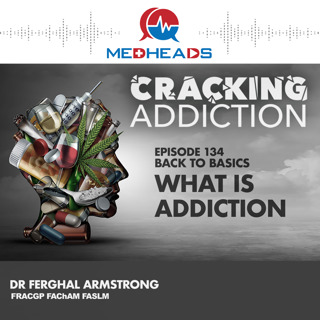
Understanding Addiction: The Science Behind Substance Dependence and Its Impact on the Brain
On this episode of Cracking Addiction, join host Dr. Ferghal Armstrong as he delves into the science behind addiction. Dr. Armstrong explains the crucial differences between drug misuse and addiction, highlighting the complex interplay of genetic, environmental, and drug-specific factors in influencing an individual's vulnerability to addiction. Delving into the physiological underpinnings, he discusses the role of dopamine in the brain and how addictive substances impact various brain structures. Throughout the episode, Dr. Armstrong dispels misconceptions about addiction, emphasizing that it's a chronic disorder of the brain and not a moral failing. Tune in as he expertly breaks down the three phases of addiction—binging, withdrawal, and poor decision making—and the specific brain regions involved. If you want to gain a deeper understanding of addiction and its underlying mechanisms, this episode is a must-listen.**Key Points**- Genetic, environmental, and drug-specific factors play crucial roles in determining an individual's vulnerability to addiction.- Dopamine, the key molecule associated with desire and reward, is released by the nucleus accumbens when exposed to addictive substances.- Addiction is a chronic brain disorder, and its three phases (binging, withdrawal, lack of control) affect specific parts of the brain, leading to compulsive substance use.**Learning Outcomes**1. *Understanding Addiction Vulnerability:* Dr. Armstrong explains how genetic predisposition, environmental influences, and the nature of the drug itself collectively contribute to an individual's vulnerability to addiction. Realizing the multifactorial nature of addiction susceptibility can aid in devising comprehensive prevention and treatment strategies.2. *Neurological Impact of Addiction:* By examining the impact of addiction on the brain, listeners will gain insight into the physiological aspects that underpin substance dependence. Understanding the role of dopamine in mediating addiction-related behaviour can help in comprehending the complexities of addictive tendencies.3. *Three Phases of Addiction:* Through a detailed exploration of the binging, withdrawal, and lack of control phases, listeners can observe how addiction manifests in different parts of the brain. This insight can unveil the intricate nature of addiction progression and assist in the development of targeted interventions.**Actionable Takeaways**1. *Recognize Genetic Vulnerability:* Reflect on your family history of addiction to understand potential genetic predispositions, but bear in mind that environmental and drug-specific factors also play pivotal roles.2. *Educate On Dopamine's Role:* Learn about dopamine's function in the brain and its connection to addictive tendencies, enabling a deeper understanding of the neurobiological processes involved in addiction.3. *Identify Addiction Phases:* Recognize the distinct phases of addiction, from initial enjoyment to compulsive use, and how they correspond to neurological changes, fostering a more holistic understanding of the addiction cycle.**Insightful Quote**"Addiction is not a moral failing, it's not a poor choice, and certainly shouldn't be treated as such. It's a chronic disorder of the brain, prone to relapse." - Dr. Ferghal Armstrong**Hashtags**#AddictionScience #Neurobiology #ChronicDisorder #DopamineRelease #GeneticVulnerability #EnvironmentalInfluences #BrainNeurology #BingingWithdrawalControl #AddictionPrevention #TreatmentStrategiesThank you for tuning in to "Cracking Addiction." Like what you heard? Make sure to subscribe to our YouTube channel and online platforms...
20 Mars 202412min
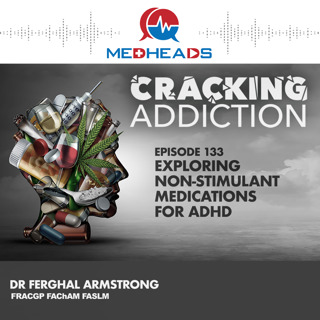
Exploring Non-Stimulant Medications for ADHD: The Role of Clonidine and Guanfacine
Dr. Ferghal Armstrong and Dr. Manu Bhatnagar delve into the complexities of non-stimulant treatments for ADHD and the pharmacological aspects involved. In this episode, the experts discuss the roles of clonidine, guanfacine, and melatonin in managing ADHD symptoms, particularly focusing on improving sleep quality and addressing underlying neurobiological factors. Their insights into the impact of lifestyle, substances, and the circadian rhythm on ADHD provide valuable information for both individuals managing the condition and healthcare professionals seeking effective treatment strategies.Focus Keyword: ADHD non-stimulant treatmentsKey Points:- The episode discusses the pharmacological aspects of non-stimulant treatment options for ADHD.- The roles of clonidine, guanfazine, and melatonin in managing ADHD symptoms, particularly sleep disturbances, are explored in detail.- The impact of substances, lifestyle factors, and the circadian rhythm on ADHD symptoms is highlighted.- The implications of ADHD on sleep architecture and strategies for managing this aspect are deeply delved into.Learning Outcomes:1. Understanding the Role of Clonidine and Guanfacine:Clonidine, initially developed for lowering blood pressure, has shown effectiveness in managing ADHD symptoms, particularly in enhancing sleep quality. Guanfacine, although not widely used due to cost and regulatory concerns, presents a promising alternative with a longer duration of action. By understanding the mechanisms and impacts of these medications, healthcare providers can make informed decisions regarding non-stimulant ADHD treatments, considering factors such as duration of action and potential adjunctive benefits.2. Addressing Sleep Disturbances in ADHD:The episode sheds light on the correlation between ADHD and delayed sleep phase disorder, underscoring the significance of sleep in managing ADHD symptoms. Insight into the application of melatonin, lifestyle interventions, and lightbox therapy as components of a comprehensive sleep management strategy can equip individuals and healthcare professionals with valuable tools for improving sleep quality in individuals with ADHD.Actionable Takeaways:1. Optimizing Non-Stimulant ADHD Treatments:Utilize the knowledge of clonidine and guanfacine as effective non-stimulant treatments for ADHD, considering factors such as the patient's response, duration of action, and adjunctive benefits in tailoring treatment plans.2. Implementing Comprehensive Sleep Management Strategies:Incorporate strategies such as melatonin supplementation, lifestyle modifications including exposure to morning light, and sleep hygiene practices to address sleep disturbances in individuals with ADHD, fostering better overall symptom management.Quote:"Abstinence in and of itself can be one treatment for ADHD." - Manu Bhatnagar
13 Mars 202418min
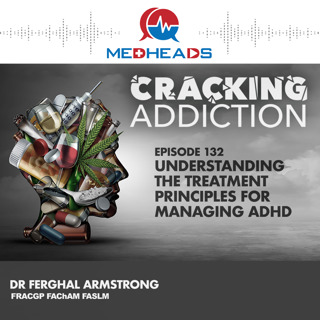
Understanding the Treatment Principles for Managing ADHD
In this episode, Dr. Ferghal Armstrong and guest Dr. Manu Bhatnagar explore the treatment principles underlying the management of ADHD. If you want to gain valuable insights into the use of stimulant medication and non-stimulant pharmacology in addressing ADHD, this episode is a must-listen.The focus keyword for this episode is "ADHD management." Dr. Armstrong and Dr. Bhatnagar provide in-depth analysis of the use of stimulant medications, such as dexamphetamine and lisdexamfetamine, as well as non-stimulant medications like atomoxetine, in the treatment of ADHD. They shed light on the difference between dexamphetamine and amphetamine, the safety concerns associated with stimulant therapy, and the role of non-stimulant pharmacology in ADHD management.Learning outcomes:1. Understanding the nuances of stimulant medications: Dr. Armstrong and Dr. Bhatnagar explain the mechanism of action and differences between amphetamines, including dexamphetamine, lisdexamfetamine, and methylphenidate, helping listeners grasp the key factors to consider when prescribing and using these medications.2. Safety considerations and risk management: The episode delves into the potential risks associated with stimulant therapy, such as psychosis and substance use disorder, while also addressing the assessment and management of these risks to ensure safe and effective treatment for individuals with ADHD.3. Exploring non-stimulant pharmacology: Listeners will gain insights into the role of atomoxetine as a non-stimulant medication for ADHD management. The episode highlights the considerations and scenarios where non-stimulant pharmacology might be preferred or necessary, providing a comprehensive view of treatment options.Actionable takeaways:1. Informed decision-making: Gain an understanding of the specific characteristics of different stimulant medications and how they impact dopamine release, enabling more informed decisions when prescribing medications for ADHD management.2. Risk assessment and mitigation: Learn about the potential risks, such as psychosis and substance use disorder, associated with stimulant therapy, and discover strategies for assessing and managing these risks to ensure patient safety and treatment effectiveness.3. Consideration of non-stimulant options: Explore the role of non-stimulant pharmacology, particularly atomoxetine, in the management of ADHD, and understand the scenarios where non-stimulant medications may be beneficial, providing a holistic approach to treatment.Quote or insight:"Every now and then, if you have that propensity to have a psychotic episode, [stimulant medication] might be the thing that adds another notch to your likelihood meter."#ADHDmanagement #StimulantMedication #NonStimulantPharmacology #PatientSafety #RiskAssessment #Atomoxetine #InformedPrescribing #SubstanceUseDisorder #PsychosisRisk #CrackingAddictionThank you for tuning in to this episode of Cracking Addiction. For more insightful content, be sure to like and subscribe to our channel. You can find more information and episodes on our Meducate website: https://meducate.com.au.
6 Mars 202419min
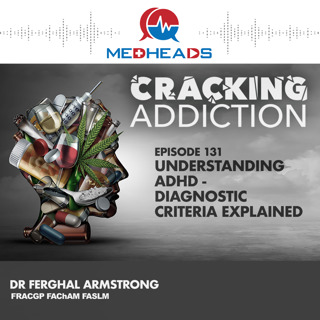
Understanding ADHD: Diagnostic Criteria Explained
Dr. Ferghal Armstrong and Dr. Manu Bhatnagar dissect the diagnostic criteria for ADHD, shedding light on the nuanced symptoms and the importance of a comprehensive assessment. By exploring the specific domain requirements, exclusion criteria, and subtypes of ADHD, they provide a deeper understanding of the diagnosis process, particularly in different age groups. The episode offers valuable insights for clinicians, educators, and individuals looking to understand ADHD and its impact on daily life.Episode focus keyword: ADHD diagnostic criteriaKey points:1. Diagnostic Criteria for ADHD: Dr. Bhatnagar explains the use of DSM-5 criteria for diagnosing ADHD in Australia, emphasizing the longstanding nature of the symptoms and the retrospective diagnosis in adults.2. Age Considerations: The discussion delves into the importance of symptoms appearing before the age of twelve, with Dr. Armstrong emphasising the need for a collateral history from primary school to ascertain symptoms across multiple domains.3. Domain Requirements: Dr. Bhatnagar elaborates on the need for symptoms to manifest in more than two settings, such as school, home, and hobbies, influencing academic, social, and personal functioning.Learning outcomes:1. Understanding Diagnostic Criteria: Gain a comprehensive understanding of the DSM-5 criteria used for diagnosing ADHD, including the duration and pervasive nature of symptoms.2. Age-Specific Considerations: Learn about the significance of symptoms appearing before the age of twelve and the role of collateral history in diagnosing ADHD in different age groups.3. Impact of Symptoms: Understand the impact of symptoms across multiple domains and settings, including academic, social, and personal aspects of an individual's life.Actionable takeaways:1. Educators and Parents: When observing potential ADHD symptoms in children, seek a collateral history from school and home to understand the pervasive nature of symptoms.2. Clinicians: Conduct a thorough assessment and use a natural history approach to gauge the impact of symptoms on an individual's daily functioning, particularly in academic and social settings.Quote: "ADHD says nothing about intelligence; it says nothing about rules. It's about being able to sit there and give focus to those things." - Dr. BhatnagarHashtags: #ADHD #MentalHealth #DiagnosticCriteria #ChildhoodDevelopment #Neurodiversity #ClinicalAssessment #DSM5 #PsychiatricDisorders #PatientCare #Meducate
28 Feb 202420min
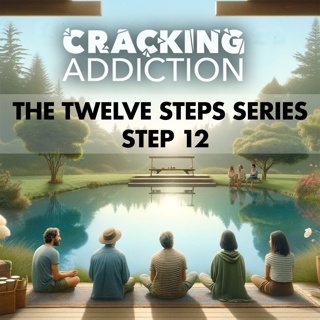
The Final Step: Understanding the Impact of the Twelfth Step in Recovery Programs
Dr. Ferghal Armstrong and Dr. Laura Petracek delve deep into the 12th step of the twelve-step program, exploring the impact of spirituality, the importance of service to others, growth, and relapse prevention. In this episode, the discussion revolves around the psychological, emotional, and practical aspects of the final step, offering valuable insights for both individuals struggling with addiction and those supporting them on their recovery journey.Focus Keyword: Twelve-Step ProgramThis episode provides a comprehensive exploration of the 12th step of the twelve-step program, shedding light on its significance and practical implications in aiding recovery from addiction. The insights shared by Dr. Ferghal Armstrong and Dr. Laura Petracek provide a holistic understanding of the program's spiritual elements, the role of service in recovery, addressing relapse, and the importance of personal growth.Learning Outcomes:1. Importance of Service: Dr. Ferghal and Dr. Laura articulate the pivotal role of service to others in the recovery journey. By engaging in service and helping fellow strugglers, individuals not only offer support but also find purpose and a sense of fulfilment.2. Relapse Management: The discussion candidly addresses the possibility of relapse in the recovery journey and highlights practical approaches to deal with setbacks. Understanding that relapse is a part of the journey, the episode provides valuable insights on how to navigate relapse with compassion and practical support.3. Spiritual Awakening: Delving into the spiritual aspect, the episode explores the concept of spiritual awakening as a result of the twelve steps and its role in fostering personal growth and contributing to the journey towards recovery.4. Medication in Recovery: Dr. Laura confronts the topic of medication in recovery, advocating for a deeper understanding and acceptance of its role in aiding sobriety. By destigmatizing medication as part of the recovery journey, individuals struggling with addiction can access comprehensive support.Actionable Takeaways:1. Embracing Service: Incorporate acts of service into your recovery journey, whether through supporting fellow strugglers or contributing to the wider community. Engaging in service can offer a sense of purpose and fulfillment, aiding in personal growth.2. Relapse Preparedness: Acknowledge the possibility of relapse and create a support network to address setbacks with compassion and understanding. By approaching relapse preparedness proactively, individuals can navigate challenging moments on their recovery journey.3. Spiritual Reflection: Reflect on the concept of spiritual awakening as a result of the twelve steps and its potential impact on personal growth. Exploring spirituality can offer a deeper understanding of oneself and the journey towards recovery.4. Destigmatizing Medication: Engage in open conversations about the role of medication in recovery. By destigmatizing the use of medication as part of the recovery journey, individuals can access comprehensive support tailored to their needs.Quote:"It's always darkest before the dawn. There's hope, and there will be another day. Hang in there." - Dr. Laura PetracekHashtags:#RecoveryJourney #TwelveStepProgram #ServiceToOthers #RelapsePrevention #SpiritualAwakening #MedicationInRecovery #MentalWellness #AddictionSupport #PersonalGrowth #CrackingAddiction
21 Feb 202425min
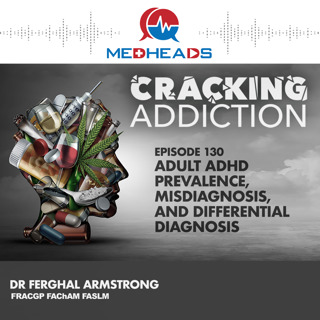
Adult ADHD: Prevalence, Misdiagnosis, and Differential Diagnosis
Dr. Ferghal Armstrong and Dr. Manu Bhatnagar delve into the complex and often misunderstood topic of adult ADHD. They discuss the prevalence of ADHD in adults, the potential role of environmental factors in its development, and the challenges in diagnosing and treating this condition in adulthood. Listeners will gain valuable insights into the differential diagnosis of ADHD, the potential impact of trauma and substance use on inattention, and the nuances of medication management for individuals with ADHD.Keywords: Adult ADHD, diagnosis, differential diagnosis, trauma, substance use, medication management.Learning outcomes:1. Understanding the prevalence and presentation of adult ADHD: The episode sheds light on the prevalence of adult ADHD and how the symptoms may manifest differently in adults compared to children. Listeners will learn about the challenges in accurately diagnosing adult ADHD and the potential impact of environmental factors on its development.2. Exploring differential diagnoses: The speakers discuss the importance of exploring differential diagnoses for acquired inattention syndrome, including substance use, PTSD, and borderline personality disorder. Listeners will gain insights into how these conditions may present similarly to ADHD but require distinct diagnostic and treatment approaches.3. Examining the impact of trauma and substance use: The episode addresses the role of trauma and substance use in exacerbating inattention and emotional dysregulation. Listeners will understand the complex interplay between trauma, substance use, and the development of inattention symptoms, particularly in the context of ADHD.4. Navigating medication management for ADHD: The speakers provide valuable insights into the complexities of medication management for individuals with ADHD, including potential comorbidities such as substance use disorders. Listeners will learn about the need for comprehensive treatment approaches that go beyond pharmacotherapy to address the functional impairments associated with ADHD.Actionable takeaways:1. Conduct a thorough differential diagnosis: When evaluating patients for suspected adult ADHD, consider a comprehensive differential diagnosis that encompasses trauma, substance use, and other mental health conditions that may present similarly to ADHD. This approach can ensure accurate diagnosis and tailored treatment plans.2. Consider the impact of trauma and substance use: Take into account the potential impact of trauma and substance use on inattention and emotional dysregulation when assessing individuals for ADHD. By addressing underlying trauma and substance use issues, healthcare providers can better support individuals with ADHD.3. Incorporate non-pharmacological interventions: Recognize the importance of incorporating non-pharmacological interventions, such as ADHD coaching and psychosocial support, alongside medication management for individuals with ADHD. This comprehensive approach can address the long-term functional impairments associated with the condition.4. Advocate for comprehensive care: Encourage a multidisciplinary approach to the management of adult ADHD, involving collaboration between mental health professionals, addiction specialists, and primary care providers. By advocating for comprehensive care, healthcare providers can address the diverse needs of individuals with ADHD.Insight: "All roads lead to Rome. So really, the inattentive prefrontal cortex is the final common pathway of the vast majority of mental health disorders, including substance use disorders." - Dr. Ferghal ArmstrongHashtags: #ADHD #AdultADHD #MentalHealth #SubstanceUse #Trauma #Diagnosis #DifferentialDiagnosis #MedicationManagement #PsychosocialSupport #ComprehensiveCare
14 Feb 202428min
